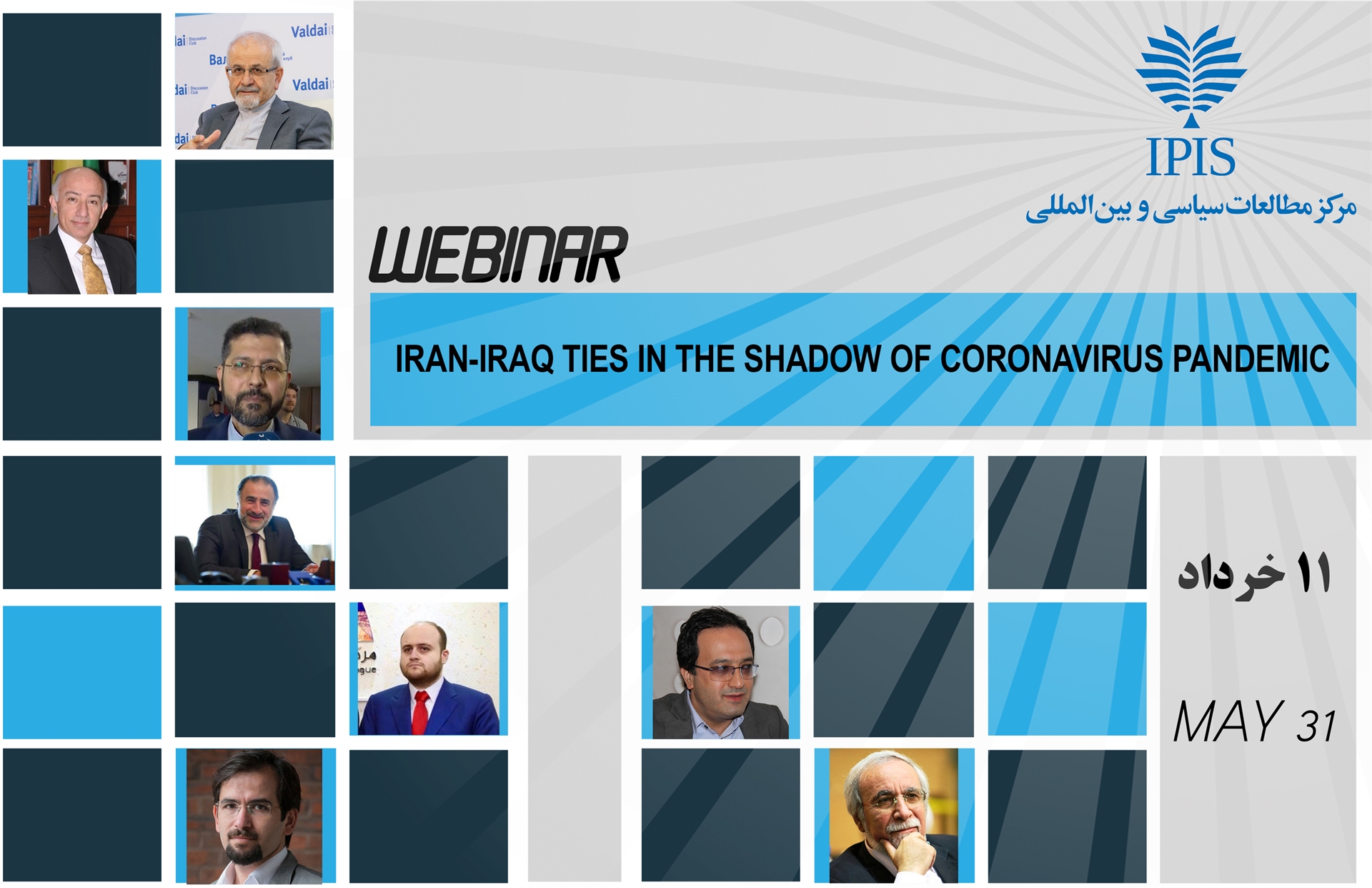Iran-Iraq Ties in the Shadow of Coronavirus Pandemic
The Institute for Political and International Studies (IPIS) hosted a virtual meeting entitled “Iran-Iraq Relations in the Shadow of Coronavirus Pandemic” on Sunday, May 31, 2020.

The Institute for Political and International Studies (IPIS) hosted a virtual meeting entitled “Iran-Iraq Relations in the Shadow of Coronavirus Pandemic” on Sunday, May 31, 2020. The speakers at the online meeting were Seyed Mohammad Kazem Sajjadpoor, head of the IPIS; Saeed Khatibzadeh, IPIS Vice-President for Research; Alireza Enayati, director general of the Persian Gulf Department at the Iranian Ministry of Foreign Affairs; Kayhan Barzegar, director of the Center for Middle East Strategic Studies and Scientific Research and also a university professor; Hassan Ahmadian, professor at the University of Tehran; Mojtaba Ferdowsipoor, senior fellow in Iraq studies at the IPIS; Sabah Zanganeh, Iran’s former ambassador to the Organization of Islamic Cooperation; Dlawer Ala'Aldeen, Founding President of the Middle East Research Institute based in Erbil; Farhad Alaeddin, chairman of the Iraq Advisory Council; Gandhi al-Kasnazani, Iraqi member of parliament; Murtadha al-Khateeb, Iraqi senior expert; Zaid al-Talaqani, chairman of the Al-Rafidain Center For Dialogue; and Majed Al-Waeli, member of Iraqi parliament.
The main questions from the speakers at the meeting were as follows:
- What are the major challenges that the new Iraqi Prime Minister is facing? What are his main priorities at home and abroad?
- What is the latest status of relations between Iran and Iraq? What are the top five challenges and opportunities the two countries are facing in regulating and enhancing their bilateral relations? (political, economic, and security ties)
- How do Iran and Iraq see and evaluate the new developments in the region? What are the potential grounds for cooperation between the two countries?
- How will the future trend in the US presence in Iraq be, particularly considering the Iraqi Parliament’s recent resolution on the withdrawal of American troops?
The major discussions raised by the participants in the meeting in response to those questions were as follows:
The relations between Baghdad and Tehran transformed after 2003. Iran and Iraq enjoy deep historical, civilizational and cultural commonalities. All Iraqi governments after 2003 have sought to deepen bilateral relations with Iran in various fields. Since 2003, the value of economic exchanges between the two countries has reached $13 billion. Leaders of the two countries have set a $20-billion trade target. Iraq has proposed that Iran should launch investment activities instead of exporting consumer goods alone.
Iraq is currently suffering from structural problems in the security, economic and political spheres. Iraq is seeking to normalize its regional and international relations, and such pivotal approach entails development of its security, stability and progress. Iraq avoids being dependent on the US or the Persian Gulf Arab neighbors, or even on Iran. The Islamic Republic of Iran has always expressed readiness to offer its capacities and capabilities in line with regional cooperation and convergence, particularly in the sphere of bilateral relations with the Republic of Iraq. Iran has been always in favor of promoting Iraq’s relations with Arab and regional countries, but this should not become a factor in implementation of the pressure policy of the US.
Iraq is a balancing element in the region and has great potential for establishing relations between the regional and extra-regional actors. In the area of bilateral relations, Iraq should begin to strengthen systematic political ties with Iran. The ministers in the cabinet of Prime Minister al-Kadhimi have been selected on the basis of resourcefulness and expertise, indicating that his cabinet stays away from political and sectarian classifications and signifying a technocrat government. The US military presence in Iraq is on the decline.
The five main areas of opportunities in the process of bilateral relations with Iraq include: the fight against ISIS terrorism and the cooperative role that Iran and Iraq play in Syria to that end in the area of regional stabilization; the political and security cooperation; the cooperation regarding special bilateral relations as in the energy sector; the agreement on dredging Arvand Rud based on the 1975 Algiers Agreement; and the trade ties.